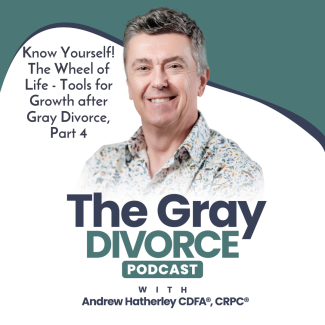
The Gray Divorce Podcast: Episode 30 Know Yourself! The Wheel of Life - Tools for Growth after Gray Divorce, Part 4
Announcement: Welcome to The Gray Divorce Podcast, hosted by Divorce Financial Analyst and Retirement Planning Counselor, Andrew Hatherley. Join Andrew and guest experts as they help late life divorcees build the financial and mental foundation for a meaningful future. There is life after divorce. Now onto the show.
Andrew Hatherley: Hello everyone and welcome to episode 30 of The Gray Divorce Podcast.
My voice sounds a little rough today, please bear with me as I'm suffering from a bug that I probably picked up on a crowded airplane over Thanksgiving. Or maybe because of swallowing a lot of saltwater in Cozumel snorkeling last weekend.
Regardless, we must soldier on, although this podcast may be a little shorter than most to preserve both my throat and your ears.
Anyway, we strive for quality over quantity, right? So, let's get on with it.
Today we finish our four-part series on the tools of positive psychology.
Well, let me correct myself. Today, we finish the 2023 portion of our series on the tools of positive psychology, I know we'll have a lot more to discuss in 2024 on the subject of positive psychology and how we can use it to grow from the major transition of late life divorce.
To finish this four-part series, I want to focus on a tool called the wheel of life. Now the wheel of life is a very popular tool used in personal coaching. It's sometimes referred to as the wheel of success or the coaching wheel or even the life balance wheel.
It is seen as a tool to help people assess their satisfaction or dissatisfaction with different domains of life and to help people set goals.
Many psychologists argue that our life is out of balance when our basic psychological needs are no longer being met. A common example would be if you were focusing too much on work while your relationship with your family deteriorates or maybe you are prioritizing your finances over your spiritual growth. It's been argued and I think this is probably accurate that this can cause real harm to both your body and mind and bring on a lot of stress.
Proponents of the wheel of life would argue that an appropriate balance between the various areas of your life will enhance your overall well-being.
It's no coincidence that the wheel of life is the 4th tool of positive psychology I'm presenting in this series after the Big 5 Personality Assessment, the VIA character strengths survey and the Japanese concept of Ikigai.
The wheel comes in fourth in this series because I'm not convinced that it shares the same utility or effectiveness as the other tools. Now, please feel free to disagree with me. You may find that the wheel of life is a very helpful tool for you. That's why I wanted to present it because I think different tools work for different people.
Much as I find the wheel of life tool to be somewhat problematic, you may not share my enthusiasm for something like the VIA Character Strength Survey.
Essentially, my issues with the wheel of life revolve around the concepts of balance and goals. You see it's taken it’s as almost a sacred cow that we should strive to have balance in our lives.
But, I'm not sure we SHOULD always seek balance. I want to get into that in a little bit after we discuss the tool the wheel of life itself. Another thing is that setting goals is an activity that’s often a lot less than it’s cracked up to be as a useful tool for getting through life. Now I'm not saying that we shouldn't have goals and strive to accomplish things. Not at all. But as we've seen through the other tools of positive psychology that we've discussed; we often don't know what we want, and we often have a tenuous understanding of who we really are. The future is uncertain and who we will be in the future is uncertain.
I think I need to do a deeper dive into the benefits and potential perils of goal setting on the podcast sometime in the future, but for now let’s get back to the wheel of life.
So, It's a very simple tool. Imagine a pie or just a circle with ten slices in it. Each one of these slices or segments represents a different life domain.
For instance:
career and work could be one slice.
other slices might be:
health and fitness
family and friends
romantic partners and love
money and finances
spirituality
fun and leisure activities.
Our environment
Growth and learning
And Spirituality
You can see how this pie chart looks by just going to the Internet and Googling the wheel of life or some of the other terms I used before like life balance wheel. There are lots of wheel of life templates on the internet. I have provided some online resources in the show notes to the podcast for you to check out for further study.
You will see that within each slice of pie, segments are numbered from one to 10, one being the closest to the center of the circle and 10 being on the outer edge of the circle. Once you've identified these important life domains, (you may have eight, or the ten examples I just mentioned), whatever, you then can rate these areas on a scale of one to 10 with one being “not at all satisfied” to 10 being “completely satisfied.” After you rate all these domains then you have a chance to sit back and think about it and maybe talk about it with loved ones, friends, life coaches if you have one, your therapist, whoever.
By connecting the dots or drawing a line from your ranking of one area to the adjacent slice of life pie, what you will see visually is likely a pretty jagged or bumpy looking circle inside the pie, with some domains or areas of life providing you a great deal of satisfaction and others perhaps very little and others maybe an average level of four or five or six level of satisfaction.
This provides you an opportunity to review the wheel as a whole, to consider its overall shape and the level of balance inside the wheel.
You might ask yourself how you feel about the shape of the wheel.
What surprises you the most?
What would you want to change the most with respect to the shape of the inner wheel?
Which category of your life domain would you most like to improve?
What do you need to do to improve a low level of satisfaction in any particular area?
Is there something you could do in one particular area that would improve more than one other area? For instance, and this is rather obvious, but perhaps spending less time on work would improve the family and spiritual dimension of your life. However, would there be an offsetting effect perhaps on the financial area of your life? These are the types of questions you need to ask yourself.
It's important to view this tool as a snapshot of the present moment. It gives you some information about the now and may point to gaps between your current situation and what you want for the future. In this sense it's a good tool to come back to periodically to review how your life might transform over time.
You should revisit the wheel over time and re-score it to understand the changes made and the actions outstanding.
Ongoing check-ins are also helpful to understand overall patterns of behavior and any negative thoughts or emotions that are blocking the changes.
Also, it’s important to understand that balance is rarely retained for long. Circumstances and priorities change; the aim is to continue the journey toward balance and avoid entering a fixed mindset that prevents transformation.
I guess this is my issue with the wheel of life. The idea of the journey toward balance. While the tool can be useful in pointing us to areas where we might need to pay more attention in order to improve the quality of our lives, I don't think our rankings of all these domains should be a similar seven or eight and make a perfect balanced circle. A, that's probably impossible but I'm not entirely sure it should be even desirable.
I remember thinking about this a while ago thinking about how we're told we should live a balanced life.
I wondered if that was accurate, if a balanced life wouldn't be an impediment to success.
Of course, that depends on how we define success. Which is why the wheel of life will be used differently by unique personalities.
I've been thinking a lot about the concepts of balance, success, and flow. It's not so simple to say that we should be leading balanced lives when activities that put us into a flow state may lead to a sense of euphoria and a great deal of success that, paradoxically, may also be accompanied by a great deal of unhappiness in other areas of our lives.
I think about my favorite Beatle, John Lennon.
He wrote the song Help in 1965 at the height of Beatlemania. It could be argued that no other popular artist reached such a level of critical and commercial success.
When asked about the song in the 1970s, Lennon always referred to it as one of his favorites.
Why?
“Because I meant it” he said.
I'm astounded by the fact that an 18-month period (!!!) from the end of 1965 to the middle of 1967, The Beatles released the albums Rubber Soul, Revolver and Sergeant Pepper. They also released the singles Penny Lane, Strawberry Fields Forever, Paperback Writer, We Can Work it Out, Day Tripper, and Rain.
I'd say that John Lennon (and Paul McCartney) were in a state of flow, a period of tremendous productivity and success.
Yet Lennon was unhappy.
Was it because his life was completely out of balance?
I couldn't find the citation, but I seem to remember Bob Dylan once saying that his greatest achievements in the mid-60s were written at a time when he was completely out of balance. I think he's even said that you can't write songs as good as those he did and have a balanced life.
So, is it a trade off?
Do we need to sacrifice some “success” to lead a more balanced and contented life? Or does it depend entirely on how we define success?
I think there is a constant push and pull between the categories in the wheel of life.
I don't think we're ever in a state of happiness for long. I do think something approaching contentedness is possible. And it might require us to enjoy or endure periods of imbalance.
I don't know. I'm musing. I'm curious to hear what you might think!
That’s all for today. All the best over the holiday season. Take care.
Announcement: Thanks so much for tuning into this episode of The Gray Divorce Podcast. To learn more or get in contact with your host, you can visit Andrew's website at transcendretirement.net. Also, please feel free to rate, subscribe, and leave a review wherever you listen to your podcasts.
That helps others find the show, and we greatly appreciate it. Thanks again for listening, and we'll catch you in the next episode.
Andrew Hatherley: Information provided is educational only and should not be construed as legal or tax advice. Each situation is unique and should be discussed with your tax or legal advisor prior to implementation. Andrew Hatherley is not an attorney and does not provide legal advice. Information provided is financial in nature.
Advisory services offered through Hatherley Capital Management LLC. Divorce Financial Analysis Services offered through Wiser Divorce Solutions, an affiliated company.

